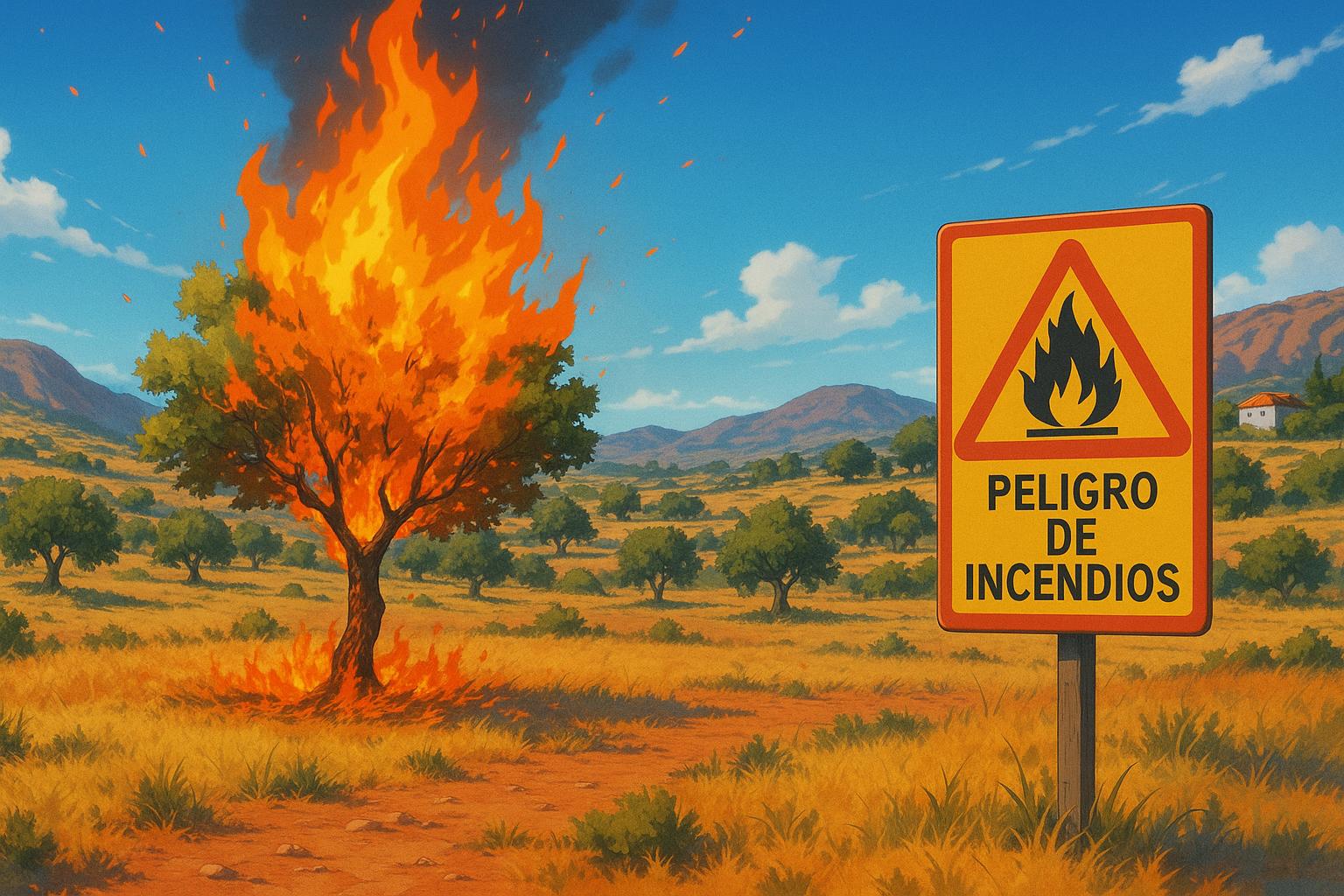Spain ramps up wildfire prevention measures this summer, introducing new rules on cigarette waste and plastics, while urging responsible behaviour amid rising fire risks across the country and the Canary Islands.
Spain, a perennial favourite for British holidaymakers, is currently facing heightened risks of forest fires, prompting its General Directorate of Civil Protection and Emergencies to issue a stern warning to the public. As of June 4, amidst an escalating “forest fire risk situation,” authorities have emphasised the critical role of personal responsibility in prevention. The organisation’s official account on X, which has over 66,800 followers, reiterated that “prevention is everyone’s job.”
Recent conditions have led to the declaration of a ‘state of pre-alert’ across various Canary Islands, effective from June 1. Regions including Tenerife, El Hierro, La Palma, La Gomera, and Gran Canaria are experiencing an acute risk of wildfires. Notably, Aemet, the national meteorological service, has issued detailed maps indicating that parts of Lanzarote and Fuerteventura are particularly vulnerable, with Fuerteventura facing ‘extreme’ red warnings for June 4 while the southern coast of Tenerife is under ‘very high’ amber alerts.
Statistics indicate that forest fires in Spain are most prevalent during the summer months, typically igniting from early June and persisting for approximately 22 weeks, with peak danger extending from July through September. However, such incidents can occur at any time of year, underlining the need for vigilance among residents and visitors alike. In line with this, the Civil Protection account has underscored the crucial message: “Never throw cigarette butts or rubbish in the mountains,” reminding the public that prevention begins with individual actions.
This year, in an effort to mitigate the threat of wildfires, Spain introduced significant regulations designed to target the disposal of cigarette butts, a notorious contributor to forest blazes, particularly in dry conditions. Following the announcement, tobacco companies are now required to clean up discarded cigarette ends, a move that aligns with wider environmental efforts aimed at reducing waste and promoting sustainability. While cigarette butts account for a significant portion of marine pollution—estimated at around 5 billion discarded annually—recent data revealed that approximately 20% of adult Spaniards smoke daily. The new laws are a direct response to the staggering amounts of toxic waste produced, as research estimates that local authorities spend between €12 and €21 per inhabitant on cigarette-related litter cleanup.
In addition to the focus on cigarette waste, the new regulations encompass bans on various single-use plastics. These include cutlery, straws, and expanded polystyrene cups, part of a comprehensive strategy to inspire responsible consumer behaviour and bolster public awareness. Tobacco companies will not only bear cleaning costs but are also tasked with educating the public on the environmental ramifications of improper disposal.
The issue of wildfires in southern Europe extends beyond Spain, with countries like Greece grappling with their own escalating threats as climate change exacerbates conditions. Last summer, a catastrophic fire on Rhodes highlighted the urgency of improved fire management strategies, with experts calling for integrated approaches to tackle the growing challenges posed by climate change. While both Spain and Greece confront formidable wildfire risks, their strategies differ, reflecting varying degrees of preparedness and public engagement initiatives.
As Spain braces for a potentially severe fire season, the proactive measures taken by authorities aim to mitigate the risks and foster a culture of environmental mindfulness. Citizens and visitors alike are thus called upon to heed warnings and adopt responsible practices that protect the natural landscape synonymous with Spain’s allure.
 Reference Map:
Reference Map:
Source: Noah Wire Services
- https://www.dailyrecord.co.uk/lifestyle/spain-tells-public-never-throw-35340695 – Please view link – unable to able to access data
- https://www.reuters.com/world/europe/greek-summer-wildfire-threat-nears-outpacing-plans-contain-it-2024-05-02/ – Greece faces an escalating threat of wildfires as climate change exacerbates conditions in southern Europe, putting pressure on inadequate fire suppression strategies. Last summer, a catastrophic fire on Rhodes forced 19,000 evacuations, highlighting the need for quicker response and better access through dense forests. Despite new measures, including clearing 19,000 hectares of forest, hiring additional rangers, and investing in firebreaks, Greece’s efforts are insufficient given the sheer expanse of its woodlands. Experts call for a shift to integrated fire management, including risk assessment and innovative firefighting techniques. As the country experiences record temperatures, the upcoming wildfire season is expected to be particularly severe, posing significant risks to agriculture, homes, and tourism.
- https://www.bbc.com/news/world-europe-64184451 – Tobacco companies will now be charged to clean up cigarette butts off the streets and beaches of Spain, according to new environmental regulations. Millions of butts are thrown away each year, releasing toxic plastic waste which can take decades to break down. Figures from 2020 show around a fifth of adult Spaniards smoke every day. The rules came into force on Friday, but it remains unclear how they will be implemented and whether costs are likely to be passed on to consumers. A report by the Catalan Rezero Foundation estimated that local authorities in Catalonia were paying between €12-21 (£11-19; $13-22) per inhabitant per year on road cleaning of cigarettes – with higher rates in coastal areas. The report called cigarette waste the ‘most abundant waste’ on the beaches of the western Mediterranean, adding that existing measures to tackle it – such as awareness campaigns and portable beach ashtrays – had been insufficient.
- https://www.reuters.com/world/europe/spain-braces-wildfires-beef-farmers-battle-red-tape-2024-03-02/ – Asturias, Spain is preparing for wildfires as a combination of old farming grievances and climate change have heightened the risk. The region, which experienced nearly 300 wildfires last spring, faces challenges due to traditional farming practices, climate change, and bureaucratic hurdles. Farmers have been accused of setting these fires to clear land for grazing, but they blame the government for poor land management. Authorities have increased their wildfire prevention budget by nearly 20% and are focusing on public awareness of the dangers of intentional burns. Farmers argue that their animals help prevent fires by eating combustible vegetation and advocate for more localized control and better compensation for livestock losses due to wildlife. Recent data shows most fires in the region are deliberately set, and farming’s economic contribution has significantly decreased. The region’s policies on wolf protection, seen as harmful to livestock, have also fueled political tensions.
- https://www.euronews.com/green/2023/01/04/tobacco-companies-must-pay-for-clean-up-of-discarded-cigarettes-in-spain – Spain has ruled that tobacco companies will have to pay to clean up cigarette butts. Millions of cigarette ends are tossed onto Spain’s streets and beaches by smokers each year. The new environmental regulations also include bans on single-use plastic cutlery and plastic straws. The rulings are part of an EU-wide drive to reduce waste and promote recycling. Tobacco companies to pay for cigarette clean up. Spain’s new environmental regulations have ruled that tobacco companies will have to foot the bills for removing discarded cigarettes from the country’s streets. The measure comes into force this Friday. Cigarette manufacturers are also obliged to remind consumers not to throw away butts in public areas. Spain has not yet said how the clean up will be carried out and what it will cost tobacco companies. A Catalan study by ‘zero waste society’ Rezero estimated the cost to be between €12-€21 per citizen per year – a total of up to €1 billion. Cigarette butts are the most common type of marine pollution – above plastic bottles and bags – according to the non-profit organisation Ocean Conservancy. Around 5 billion cigarettes are thrown into the ocean each year. The harmful substance they emit during decomposition can be lethal to sea creatures.
- https://www.theguardian.com/world/2023/jan/03/tobacco-companies-cleaning-up-cigarette-butts-spain – Tobacco companies are to be forced to foot the bill for cleaning up the millions of cigarette ends that smokers discard every year under new environmental regulations in Spain. The ruling, which comes into force this Friday, is part of a package of measures designed to reduce waste and increase recycling. It includes a ban on single-use plastic cutlery and plates, cotton buds, expanded polystyrene cups and plastic straws, as well as cutting back on plastic food packaging. The law conforms to a European Union directive limiting the use of single-use plastics and which aims to oblige polluters to clean up the mess they create. Cigarette manufacturers will also be responsible for educating the public not to discard their butts in the public space but it remains unclear how the clean-up will be implemented or what it will cost. New Zealand passes world-first tobacco law to ban smoking for next generation. Cigarette ends are one of the most ubiquitous forms of litter and take about 10 years to decompose, in the process emitting toxic substances such as arsenic and lead. According to the Ocean Conservancy NGO, cigarette butts are the most common form of marine pollution, more even than plastic bags and bottles, with an estimated 5bn discarded in the ocean. In the interests of public health and to reduce the number of butts finding their way into the sea, about 500 Spanish beaches have been declared smoke-free. Last year, Barcelona outlawed smoking in all the city’s 10 beaches.
- https://www.theolivepress.es/spain-news/2023/01/05/tobacco-companies-to-pay-for-cleaning-millions-of-cigarette-butts-under-new-laws/ – New laws that force tobacco companies to pay the cost for cleaning up millions of cigarettes will come into effect across Spain on Friday. The new rules were approved last year as part of a law banning single-use plastics such as cutlery and straws, and was created in response to a European Union directive. The law also states that tobacco companies could also be required to pay for the installation of public receptacles for cigarette butts. Packaging should also urge smokers to dispose of butts responsibly. The Spanish government has yet to calculate how much tobacco companies will have to pay to compensate for the clean-up costs borne by local authorities, but one study suggested the amount could run into hundreds of millions of euros annually. Cigarettes eDiscarded cigarette butts are the single biggest litter item globally. According to research by Rezero, a private foundation, the annual cost of cleaning up cigarette waste in the region of Catalunya runs from €12 to €21 per inhabitant, with the higher rate for those in seaside areas where beaches are combed for butts. “In Catalunya, cigarette butts generate more than 2700 tonnes of waste per year, and it is estimated that 70 per cent of cigarettes smoked globally end up on land or in natural spaces,” says the 2020 report, conducted with the support of Catalunya’s regional government. Discarded cigarette butts are the single biggest litter item globally, with a World Health Organisation report calculating that 4.5 trillion are tossed into the environment each year, most of them ending up in waterways and the sea. The vast majority of tobacco products have cigarette filters that contain cellulose acetate, a plastic that does not biodegrade but slowly breaks into microplastic particles. Aquatic birds and fish have been found containing large amounts of filter plastic residues. The harmful chemicals concentrated in cigarette butts are also damaging to the environment. Ireland, too, has introduced legislation to make tobacco companies liable for part of the cost of cleaning up cigarette waste, with the size of the bill to be set when figures become available. Last year, Ireland’s local authorities spent €85 million on street cleaning, with cigarette butts accounting for half of all litter, according to the country’s National Litter Pollution Monitoring System.













